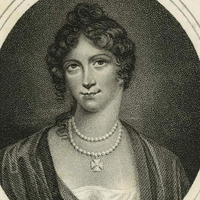The Linnet and the Cat
WHEN fading Autumn’s latest hours
Strip the brown wood, and chill the flowers,—
When evening, wint’ry, short, and pale,
Expires in many a hollow gale,—
And only morn herself looks gay,
When first she throws her quiv’ring ray
Where the light frost congeals the dew,
Flushing the turf with purple hue;
Gay bloom, whose transient glow can shed
A charm like Summer when ’tis fled!—
A Linnet among leafless trees
Sung, in the pauses of the breeze,
His farewell note, to fancy dear,
That ends the music of the year.
The short’ning day, the sadd’ning sky,
With frost and famine low’ring nigh;
The Summer’s dirge he seem’d to sing,
And droop’d his elegiac wing.
Poor Bird! he read amiss his fate,
Nor saw the horrors of his state:
A prowling Cat, with jetty skin,—
Dark emblem of the mind within,—
Who feels no sympathetic pain,
Who hears unmov’d the sweetest strain,—
Fit but ‘for stratagem and spoil,’
Mischief his pleasure and his toil,
Drew near—and shook the wither’d leaves;—
The Linnet’s flutt’ring bosom heaves—
Alarm’d he hears the rustling sound;
He starts—he pauses—looks around;
Too late—more near the savage draws,
And grasps the victim in his jaws!
The Linnet’s muse, a tim’rous maid,
Saw, and to Molly scream’d for aid;
A tear then fill’d her earnest eye,
Useless as dews on desarts lie;
But Molly’s pity fell like showers
That feed the plants, and wake the flowers;
Heroic Molly dauntless flew,
And, scorning all his claws could do,
Snatch’d from Grimalkin’s teeth his prey,
And bore him in her breast away.
His beating heart and wings declare
How small his hope of safety there;
Still the dire foe he seem’d to see,
And scarce could fancy he was free.
Awhile he cow’rd on Molly’s breast,
Then upward sprung, and sought his nest.
Dear Molly! for thy tender speed,
Thy fearless pity’s gentle deed,
A ribbon-garland, ‘rosy red,’
My votive gift, shall deck thy head;
That garland at the village fair
Shalt thou, dear maid, in triumph wear;
And may the blooming wreath obtain
The youth thy heart desires to gain.
And thou, sweet Bird, whom rapture fills,
Who feel’st no sense of future ills,—
That sense which human peace destroys,
And murders all our present joys,—
Still soothe with song th’ autumnal hours;
And when the wint’ry tempest lowers,
When snow thy shiv’ring plumes shall fill,
And icicles shall load thy bill,
Come fearless to my friendly shed,
This careful hand the crumbs shall spread,
Then peck secure, these watchful eyes
Shall guard my Linnet from surprise.

